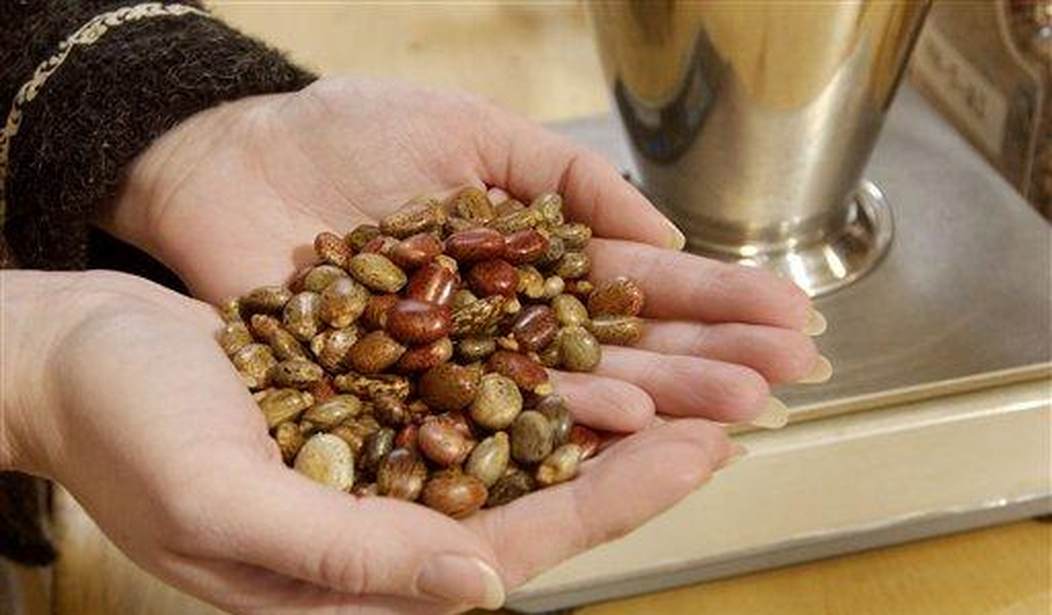It was all an accident, you see. Dr. Ishtiaq Ali Saaem wanted to plant some castor beans in his apartment to liven up the place and went onto the Internet to order a packet. But inadvertently, entirely by accident, he insists, he ordered one hundred packets, that is, eight hundred castor beans instead of eight. Castor beans can be used to make ricin. Then, no doubt by accident again, Saeem researched how to make poisons that could be made and could not be tasted.
The Justice Department reported that Saeem, who is “the director of advanced research at a Massachusetts biotechnology firm,” pleaded guilty to obstruction of justice and last Thursday was sentenced “in federal court in Boston for obstructing an investigation into his efforts to acquire the deadly toxin, ricin.” The government wanted him to serve a year in prison, but Saeem got off far more easily: he was sentenced to three years of probation, during six months of which he will be held in “home confinement.” Saeem was also fined $5,500.
Saaem, the Justice Department noted, is “a Bangladeshi national residing in Massachusetts” who has a Ph.D. in biomedical engineering. He “became interested in acquiring ricin from castor beans as well as convallatoxin, a poison found in lily of the valley plants, after watching ‘Breaking Bad,’ a popular television show. Saaem ordered 100 packets of castor beans online, each containing eight seeds. Saaem falsely told law enforcement agents that he purchased castor beans for planting at his apartment for decoration and that he had accidentally purchased 100 packets instead of one. After he spoke to agents, Saaem researched tasteless poisons that could be made at home.” Really, who among us hasn’t accidentally bought poison ingredients and researched poisons?
But when he met with law enforcement officials, Saeem “stated that his interest in buying castor beans related to an interest in gardening. He also made misleading statements about his knowledge of ricin,” which he was likely to know all about, given that he was an advanced researcher at a biotechnology firm.
At least in its press release, the Justice Department doesn’t consider the question of Dr. Ishtiaq Ali Saaem’s motive for his odd behavior. As he is a native of a jihadi hotspot, however, DoJ officials would be irresponsible not to investigate the possibility that Saeem was planning some kind of jihad attack. Jihad poisoning plots are not new. Zee News reported in July 2019 that “the Maharashtra anti-terror squad has foiled a plot by terrorists to poison the ‘mahaprasad’ of the famous Mumbreshwar Mahadev temple in Thane district.”
“Mahaprasad” or “prasad” consists of a large number of food items that are offered to the gods in Hindu temples and then consumed by worshippers. This particular poisoning plot was the work of the Islamic State, which, although largely driven out of its former caliphate in Iraq and Syria, is busy trying to murder large numbers of infidels elsewhere. Zee News continued: “The day when the suspects planned to poison the prasad, it was consumed by at least 40,000 devotees.”
Related: California: Convicted Terrorist Gets 15 Years for Selling Meth While on Supervised Release
Al-Qaeda has long considered the contamination of food as a jihad mass murder tactic. And in 2017, the Islamic State called on Muslims to poison food in Western supermarkets. This kind of poisoning has actually happened at least twice in Britain: in February 2008, according to the Evening Standard, “two shop-owners were today fined for selling chocolate cake – which had been sprinkled with human faeces. A horrified customer ate the foul-smelling gateaux but noticed that it didn’t taste or smell ‘quite right’ and handed the cake to public health scientists. The analysts soon established that the sweet treat was covered in faeces and legal proceedings against the shop owners were started.”
In March 2009, the Hamilton Spectator reported that a Muslim woman named Mastoora Qezil “has been charged with allegedly inserting 13 sewing needles into packages of meat products found in a grocery store…. Thirteen needles of various lengths were found inserted in 12 packaged products.” The following month, the BBC reported that “a chemist who contaminated food and wine in Gloucestershire supermarkets with his own urine and faeces has been sent to prison for nine years.” A “right-wing extremist”? No: “Sahnoun Daifallah, 42, of Bibury Road, Gloucester, was found guilty of four counts of contaminating goods at four businesses in May 2008.” At Daifallah’s hearing, Judge Carol Hagen said that he was “a potentially very dangerous man.”
Is the strange case of Dr. Ishtiaq Ali Saaem another case of this kind? In today’s hyper-politically correct environment, will the possibility even be investigated?










Join the conversation as a VIP Member